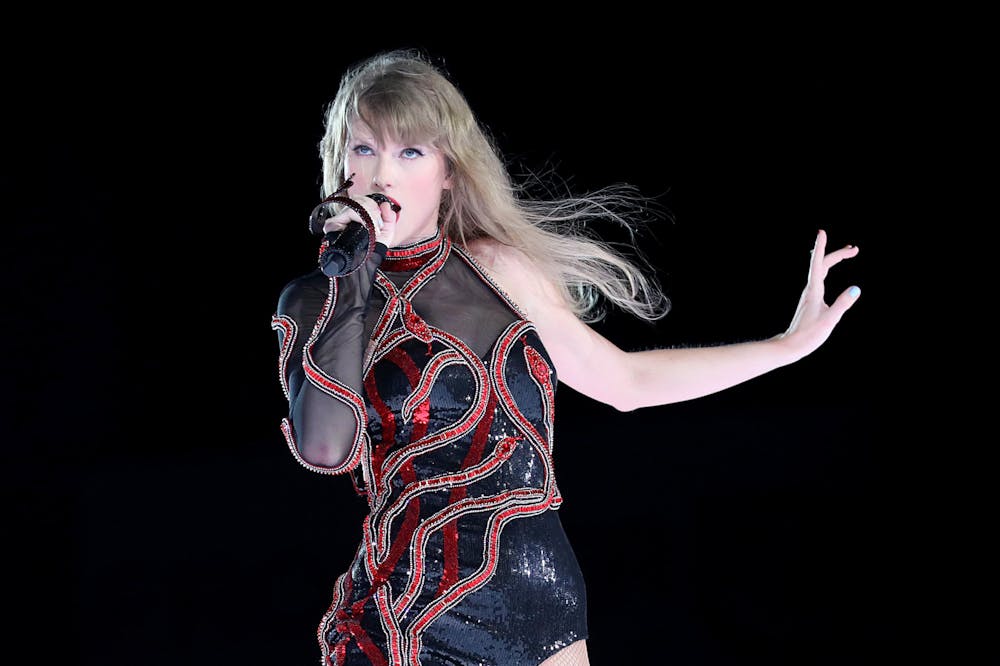It seems more and more that reading about any major event – music related or not – will, in some way, lead to Taylor Swift. Evidently, a news cycle without a piece on Swift isn’t a news cycle at all, and it feels dystopian.
Two catalysts have led to Swift’s sudden massive explosion in popularity and funneled in more media attention: the beginning of the Eras tour and her new relationship with Travis Kelce – tight end for the Kansas City NFL. These are somewhat normal events for celebrity outlets to cover. However, the impact that Swift’s coverage has had on the media, public behavior and the environment itself is something rather unfamiliar and alarming.
Actually managing to score tickets to hear “Taylor’s Version” songs live may not be worth the rewarding feeling of “supporting an artist.” Some fans found themselves overpaying to sit behind the stage, according to the Daily Dot. Few artists have seen such a monstrous demand strong enough to convince fans to pay to watch the show from, well, a big backstage TV. Even if Taylor herself didn’t know some fans were placed in a viewless cash-grab seat, it still seems odd to be detached from fans enough to not have been made aware of the situation.
The number of female viewers grew by 2 million for a Kansas City NFL game in October, and record viewer numbers have been consistently set in the months since, according to a report by Nielsen Media Research. It’s baffling to see the magnitude of influence Swift has on the public. Every celebrity may have dedicated superfans, but not every celebrity can instantly change the historical statistics of national television viewership.
The games that drew millions of Swifties to watch a sport – one that they may not even be interested in – were happening simultaneously within the schedule of Swift’s impossibly successful Eras tour. This means that, in order to keep up public appearances, Swift was flying between shows and games quite often. Carbon Credits, a team that keeps track of the carbon emissions of private jets, has reported an astonishingly high number for Swift’s private travels: 138 tons of CO2 during a three-month span.
It would be unfair to say she’s kept silent about it. She has, at least, acknowledged her excess traveling, but being in a position powerful enough to burn through money and resources at her rate is not endearing.
Music taste aside, I have a hard time understanding her immense popularity in general. It could have been any pop star; it could have been any singer with the relatable pandering approach to songwriting. Why Taylor?
Swift’s discography is tailored to be the soundtrack for common, relatable issues, like general insecurities and relationship problems. Feeling spoken to through music is important, but the corporate feel of Swift’s music supports none of the personal connection.
Taylor is one of the single most streamed artists globally on Spotify, boasting over 104 million monthly listeners. She has over 279 million followers on Instagram, 95 million on Twitter, earning millions of likes on each post. These are almost unimaginable numbers – something greater than celebrity status.
It is bewildering to know that so very many people consider themselves to be in a niche of fans for a rather unremarkable songwriter. A larger than life, out-of-touch celebrity whose fanbase is ostensibly, impossibly powerful seems like the last person that the general public should flock to for the purpose of influencing their opinions.
Taylor Swift, a single person – of course, backed by a team of “yes-men” – was estimated by The Federal Reserve to boost the economy by an added $5 billion, thanks to the success of her tour. Maybe that’s a good thing, maybe that’s dystopian. Ultimately, it’s up to personal opinion to decide, but it is admittedly difficult to conduct research nowadays without many of the search results reading, “But what does Taylor think?”
Sadie Hopkins is a freelance reporter for the Daily Lobo. She can be reached at culture@dailylobo.com
Get content from The Daily Lobo delivered to your inbox






